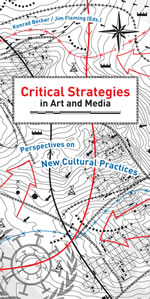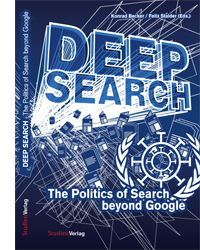The copyright crisis, which we experience in countless episodes everyday, is, to a large degree, nothing more than the crisis of the Fordist model of production within the cultural industries.…
THE POLITICS OF SEARCH BEYOND GOOGLE
A Publication of Word-Information Institute
Konrad Becker/ Felix Stalder [eds.] Studienverlag & Transaction Publishers, 2009. 220 pages. ISBN 978-3-7065-4795-6
Information is useless if it cannot be found and it is not a co-incidence that a search engine like Google has turned into one of the most significant companies of the new century. These engines are never just practical tools to deal with information overload. Such cognitive technologies embed political philosophy in seemingly neutral code.


